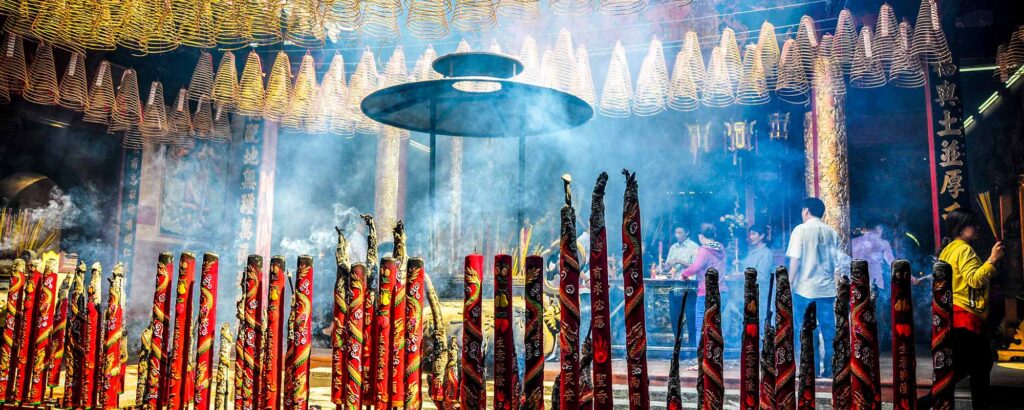Chinatown, known as Cho Lon, is a vibrant and culturally rich neighborhood in Ho Chi Minh City. Steeped in history and tradition, it is home to numerous temples and landmarks that reflect the Chinese influence in the area. From the bustling Binh Tay Market to the ornate Thien Hau Pagoda, Chinatown offers a sensory feast of sights, sounds, and flavors. Hidden gems like Hao Si Phuong Alley and Lantern Street reveal the neighborhood’s hidden charms, inviting you to explore its narrow alleys and immerse yourself in its unique atmosphere.
About Cho Lon – Saigon’s Chinatown
Cho Lon, also known as Saigon’s Chinatown, has a fascinating history that dates back centuries. It began as a settlement of Chinese traders who migrated to the area during the 18th century. These immigrants brought their vibrant culture, traditions, and businesses, creating a distinct Chinese enclave within Saigon.
Over time, Cho Lon grew and developed into a bustling commercial district, known for its vibrant markets, temples, and traditional Chinese architecture. The area became a melting pot of Chinese, Vietnamese, and other ethnic communities, fostering a unique multicultural atmosphere.
Today, Cho Lon is a vibrant neighborhood that continues to thrive as a commercial and cultural hub. It’s renowned for its lively street markets, offering an array of Chinese goods, herbs, spices, and traditional crafts. The streets of Cho Lon are filled with the aroma of delicious Chinese cuisine, tempting visitors with a wide variety of flavors and culinary delights.
One interesting fact about Cho Lon is that it houses some of the oldest and most significant Chinese temples in Ho Chi Minh City. These temples serve as important spiritual and cultural centers, attracting worshippers and visitors alike.
Where is Chinatown located?
Chinatown, also known as Cho Lon, is located in District 5 of Ho Chi Minh City. Specifically, it is situated in the western part of the district, bordered by Tran Hung Dao Street to the north and the Saigon River to the south.
To get to Chinatown from the city center in District 1, you can take a taxi. The approximate taxi fare may vary depending on the specific location in District 1 and the traffic conditions, but it is typically around 50,000 to 100,000 Vietnamese Dong (VND), which is roughly 2 to 4 US dollars.
10 highlights of Saigon’s Chinatown
1. Binh Tay Market
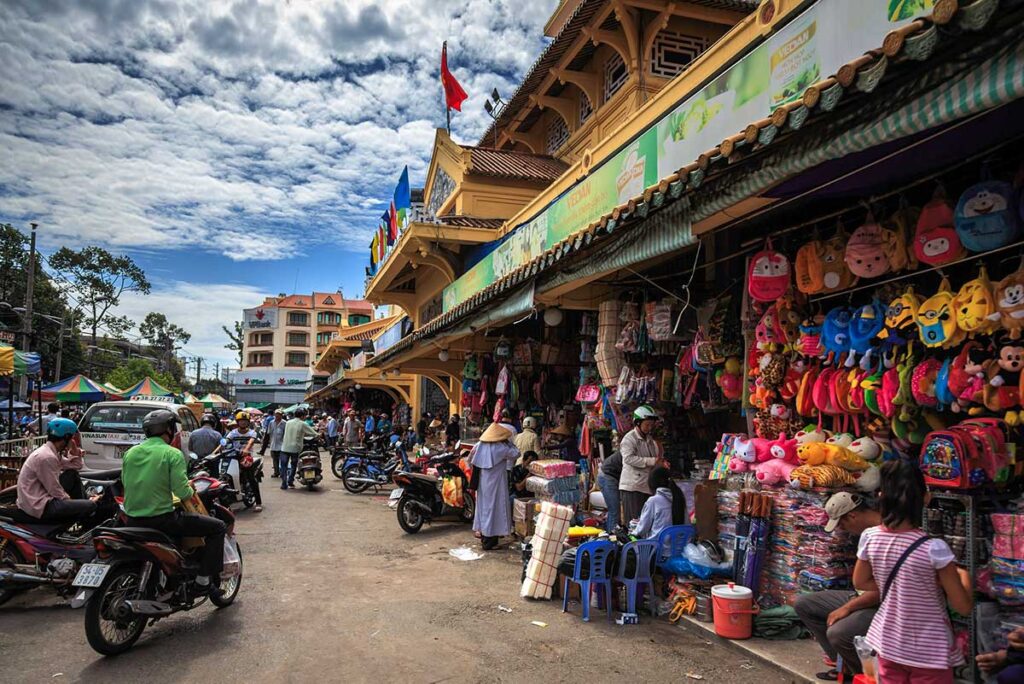
Binh Tay Market is a bustling and authentic market in Saigon’s Chinatown, offering a vibrant and diverse shopping experience. Unlike the tourist-focused Ben Thanh Market, Binh Tay Market caters primarily to locals, making it an excellent place to immerse yourself in the daily life of the neighborhood. With its wide variety of Chinese food and goods, the market is a culinary delight, where you can sample delectable snacks, fresh produce, and traditional Chinese ingredients.
2. Lady Thien Hau Pagoda

One of the most notable temples in Saigon’s Chinatown is Lady Thien Hau Pagoda. This stunning temple is dedicated to the goddess Thien Hau, the protector of sailors and fishermen. You can marvel at the ornate altars, colorful decorations, delicate porcelain figurines, and intricate woodcarvings that showcase the rich Chinese cultural heritage within the temple.
3. Local houses and streets
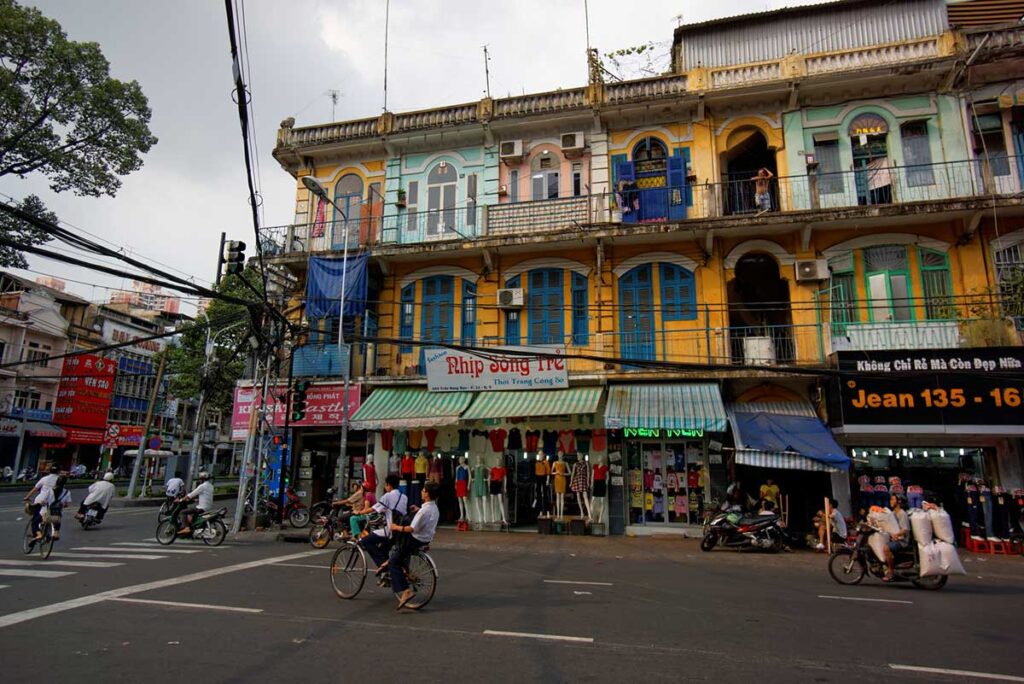
As you explore Saigon’s Chinatown, you’ll be transported to a residential area reminiscent of Hong Kong or China itself. The houses in this neighborhood were constructed during the late 19th century and the 1920s, showcasing architectural styles that embody Chinese influences.
Many of these homes are adorned with vibrant red lanterns or a few touches of red paper, symbolizing good luck and prosperity. If you observe the shop signboards, you’ll notice they often display both Vietnamese and Chinese languages
4. Hao Si Phuong Alley
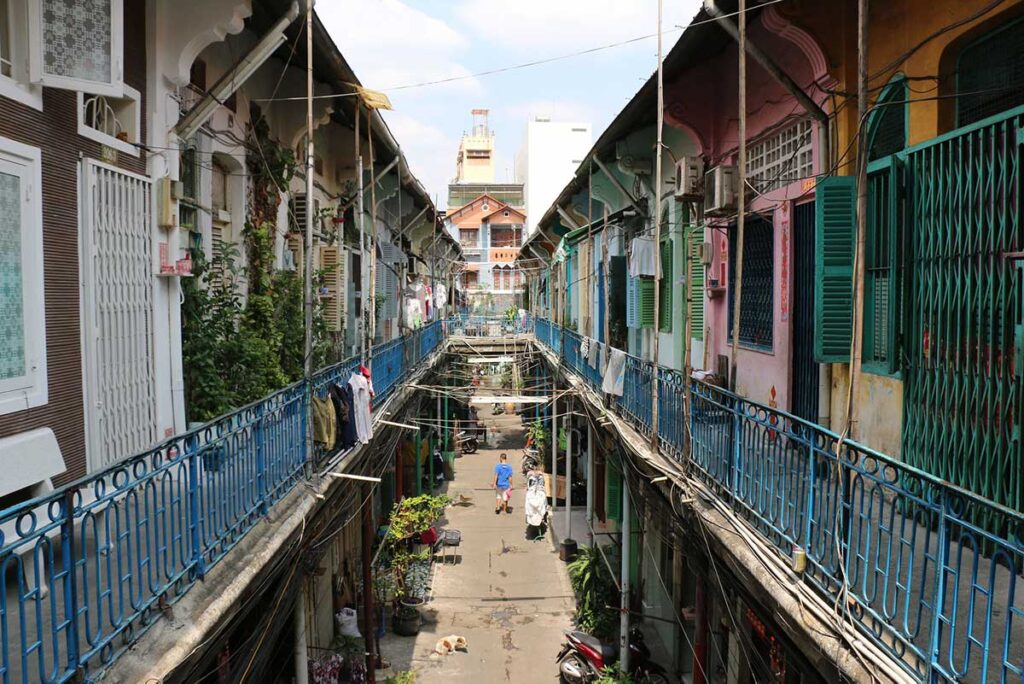
Another local place to visit in Chinatown is Hao Si Phuong, a century-old alley predominantly inhabited by people of Chinese descent. The alley is known for its eye-catching houses, distinguished by their vibrant colors and unique architectural styles.
Originally constructed as multi-story apartments, these interconnected houses feature narrow staircases that lead to small living spaces on the upper floors.
Privacy is scarce in the narrow alleyways, as neighbors hang laundry between homes and doors remain open during the day. The presence of cozy coffee shops nestled among the apartments adds to the vibrant atmosphere.
5. Chinese medicine pharmacies
Chinatown is also home to numerous Chinese medicine pharmacies, where you can find a wide range of traditional herbal remedies and medicinal products. These pharmacies offer a glimpse into the rich history and continued practice of traditional Chinese medicine in the area.
6. Lantern Street
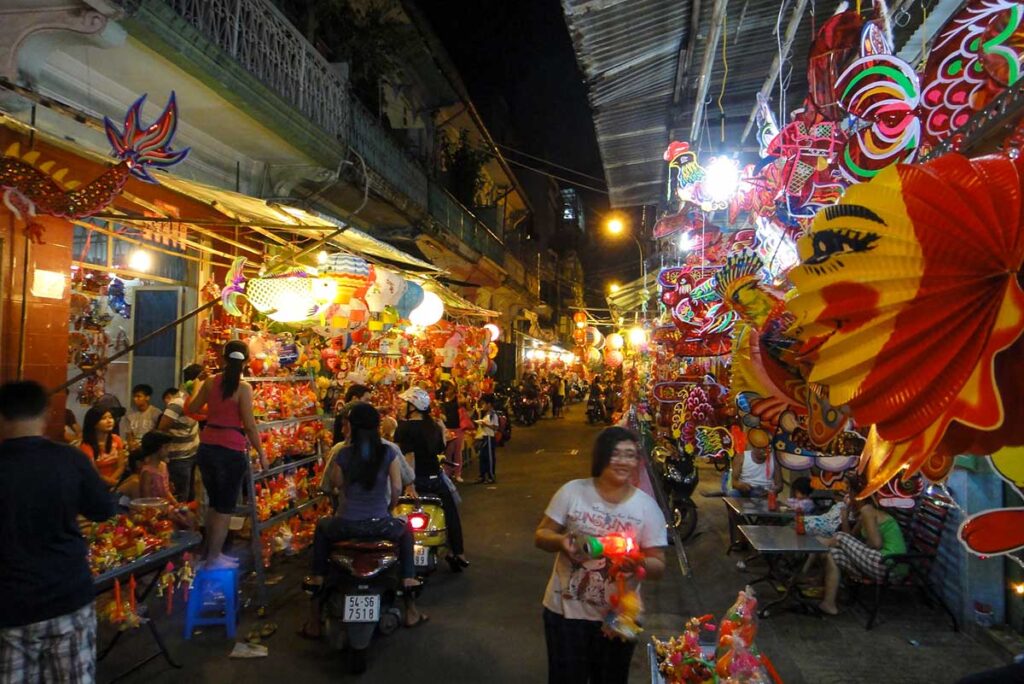
Lantern Street, situated along Luong Nhu Hoc Street, serves as a hub for people seeking to purchase lanterns, drums, and other festive items. It is also the best place to captures the vibrant spirit of the Mid-Autumn Festival.
7. Quan Am Pagoda
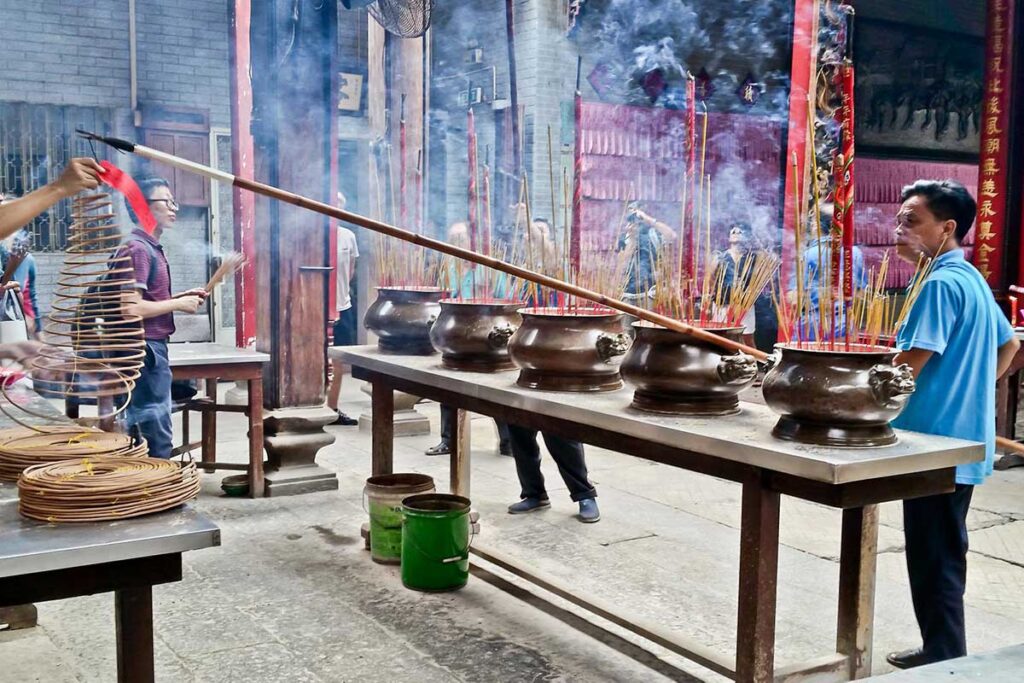
Nestled on a quiet, narrow street amidst bustling food stalls, Quan Am Pagoda is a hidden gem in Saigon’s Chinatown. Established in the 19th century and dedicated to the Goddess of Mercy, the pagoda exudes a cozy ambiance. Despite its smaller size, it boasts vibrant colors, featuring magnificent lacquer statues of guardian spirits at the entrance and beautiful ceramic scenes on the roof, depicting characters from traditional Chinese folklore.
8. Cha Tam Church
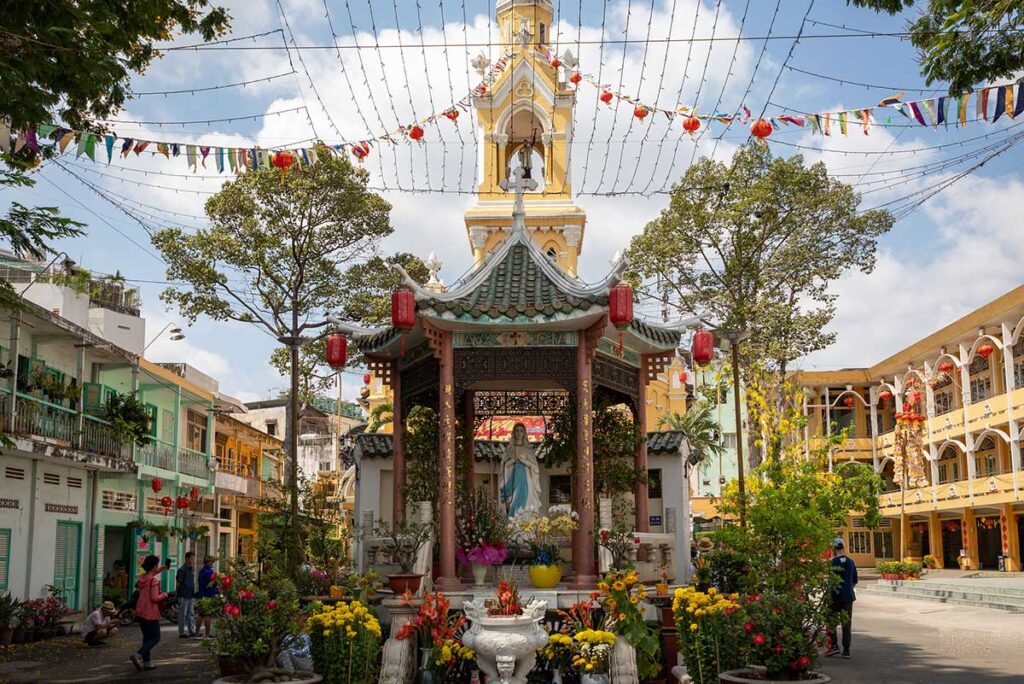
Cha Tam Church, also known as St. Francis Xavier Church, is a charming local church located in the heart of Chinatown in Ho Chi Minh City. Surrounded by traditional houses, it exudes an authentic local vibe. The church holds historical significance as it was the place where President Ngo Dinh Diem and his brother sought solace before their tragic assassination during the 1963 military coup.
9. Nhi Phu Temple
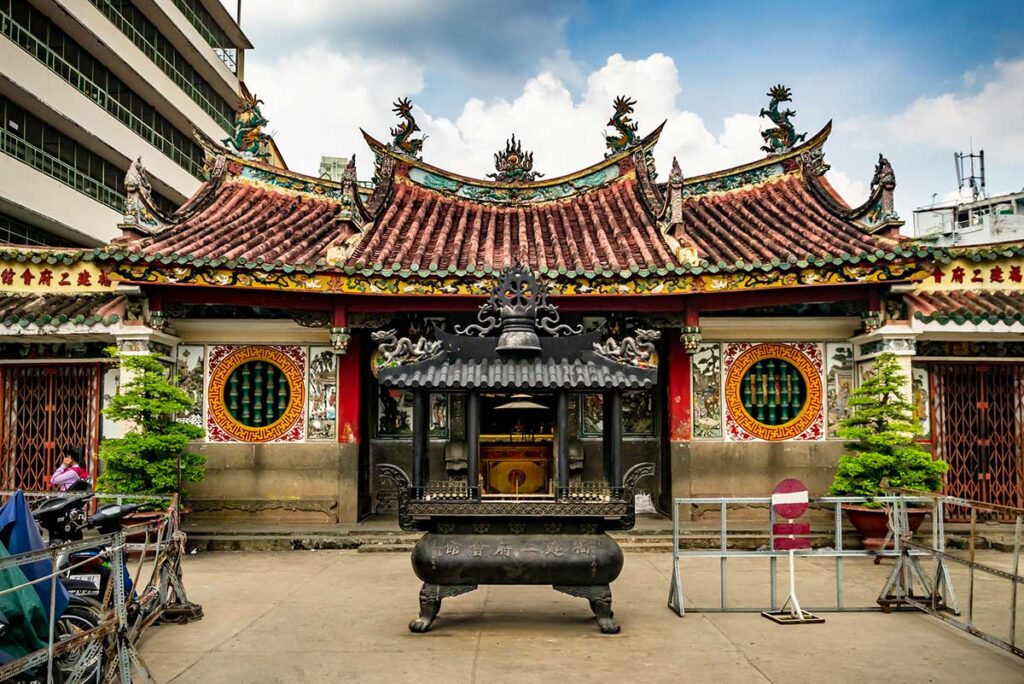
Nhi Phu Temple, also known as Ong Bon Pagoda, is one of the oldest Chinese pagodas in Saigon. Constructed in the early 18th century by the Chinese community in Cho Lon, it holds great historical and cultural significance.
The temple’s architecture showcases the distinctive Chinese style, with intricate designs both on its exterior and interior. It serves as a religious center for the Hoa community in Saigon and is the only temple in the city where Ong Bon, a prominent Chinese figure, is worshipped.
10. Cholon Mosque
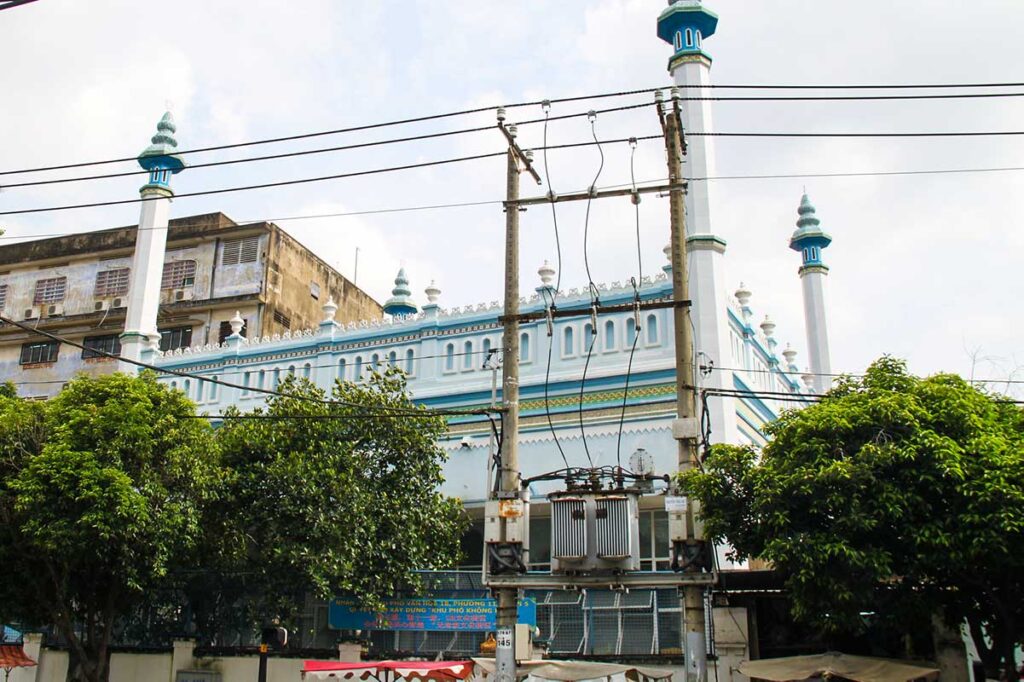
Cholon Mosque, constructed in 1932 by the Vietnamese Tamil Muslims, is a notable religious site in Chinatown that predominantly caters to Malaysian and Indonesian Muslims residing in Ho Chi Minh City. The mosque stands out with its simple yet elegant design, adorned in calming shades of blues and greens, offering a serene ambiance amidst the vibrant surroundings.
Food and restaurants
Chinatown offers a delightful culinary experience with its diverse range of Chinese food that is both flavorful and captivating. From delectable dumplings and wontons to flavorful duck noodles, Fish Noodle Soup, Stewed Duck Noodle Soup, Jiao Zi, Chili Paste Noodle Soup, and Teochew Porridge, there are numerous restaurant options to choose from, each offering its own unique specialties. The prices at these establishments are generally affordable, making it accessible for a wide range of diners.
As you explore the streets of Chinatown, you’ll notice that most signs and menus are displayed in both Chinese and Vietnamese, reflecting the cultural fusion of the area.
If you have a sweet tooth, a visit to Chau Van Liem street will satisfy your cravings with a delightful array of traditional Chinese desserts and refreshing drinks.
